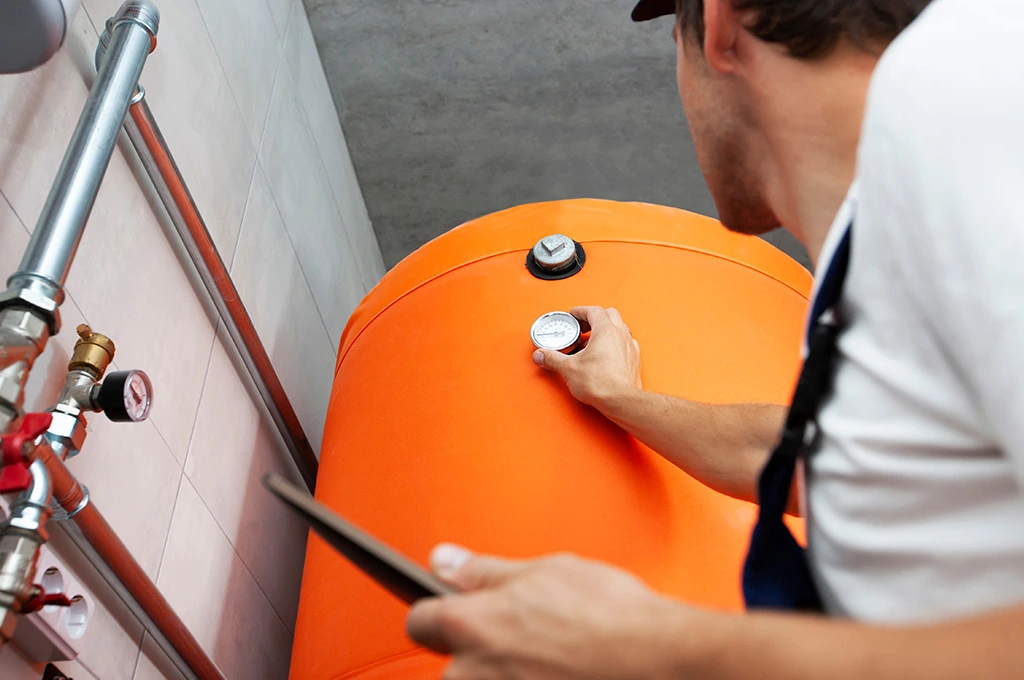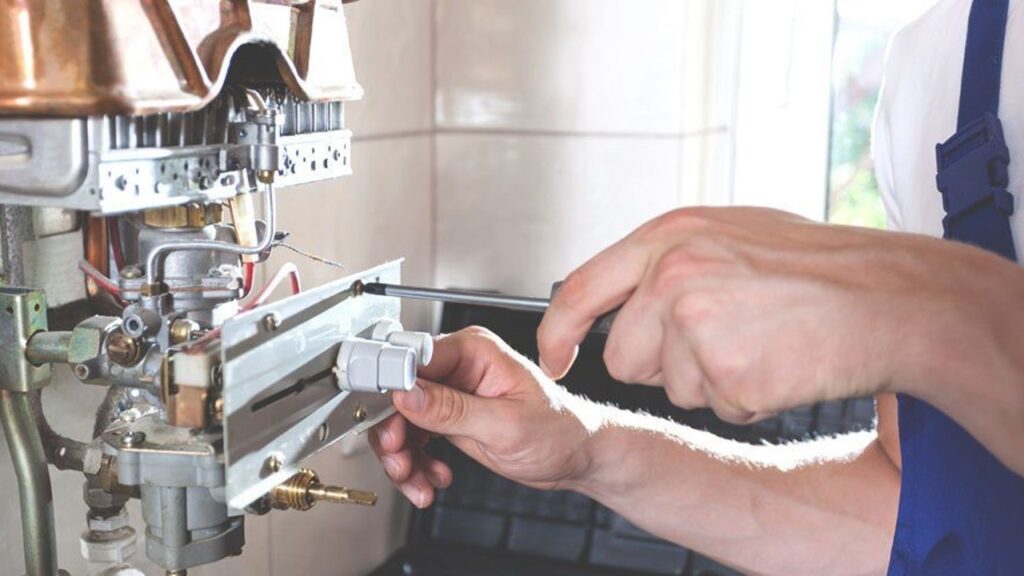When replacing your boiler, it’s easy to focus only on the unit itself. But there’s another part of your heating system that deserves attention, your oil tank.
If your tank is aging, damaged, or not up to code, it can cause major headaches later. In this guide, we’ll walk through how to know if you need a new oil tank when upgrading your boiler and what Rhode Island homeowners should keep in mind during any boiler service.
Do I Need a New Oil Tank When Replacing a Boiler?
If your oil tank is older than 15–20 years, shows signs of corrosion or leaks, or doesn’t meet safety codes, it should be replaced when performing a boiler service. A sound, newer, and inspected tank can often be reused safely.
Key Takeaways
- When you schedule a boiler service or replacement, your oil tank’s condition matters more than most homeowners realize.
- If your tank is old, corroded, or fails inspection, replacing it alongside your boiler is often the safest choice.
- Rhode Island homeowners should check local regulations and have a professional inspect the tank before keeping or reusing it.
- Upgrading both the tank and boiler together saves time, avoids leaks, and ensures long-term efficiency.
- Acorn Oil provides expert boiler repair, replacement, and installation services throughout Rhode Island.
Why the Oil Tank Matters During Boiler Service

Your oil tank is the boiler’s fuel source. If it’s compromised, it affects performance, efficiency, and even safety.
A routine boiler service checks the unit, piping, and controls, but the tank’s condition determines whether the system can deliver clean, uncontaminated fuel. In Rhode Island’s cold climate, where oil heat is still common, a leaking or clogged tank line can mean unexpected outages.
Even if you’re just doing a quick boiler repair or replacement, ask your technician to evaluate the tank as part of the overall service.
Key Signs Your Existing Oil Tank Needs Replacing
Age and Material of the Tank
Most residential oil tanks last about 15–20 years. Older steel tanks can corrode from the inside, even if they look fine outside.
If your tank was installed before the early 2000s, it’s likely nearing the end of its life. Modern double-walled or fiberglass tanks offer much better protection against leaks and condensation.
Action tip: Check the manufacturing label or installation record. If it’s missing or unreadable, assume the tank is older and plan for replacement.
Visible Damage, Leaks, or Rust
Rust streaks, damp spots, and oil odors are early warning signs.
Even a small leak can lead to soil contamination, cleanup costs, and insurance claims. Condensation inside the tank can also cause microbial sludge, which clogs filters and damages the boiler’s fuel line.
Action tip: Place a drip pan under the tank and inspect it regularly for moisture or oil traces.
Compliance and Local Regulations
Rhode Island has strict environmental regulations regarding oil storage. Tanks must meet state fire and safety codes, with proper clearances and secure fuel lines.
If your tank is non-compliant or lacks secondary containment, insurers may require an upgrade before covering any oil-related damage.
Action tip: Always check local code updates before investing in a new boiler installation.
When You Can Keep the Existing Tank
Not every boiler replacement means you need a new tank. If your oil tank is under ten years old, free of rust or leaks, and passes inspection, it may be perfectly fine.
Make sure a licensed technician inspects the tank for corrosion, venting, and line condition. If everything checks out and your new boiler uses the same type of fuel line connection, keeping the existing tank is a reasonable choice.
Pro tip: Document the inspection and cleaning as part of your boiler service record. It helps with future insurance and warranty claims.
Benefits of Replacing the Oil Tank Alongside Boiler Replacement
Replacing your oil tank at the same time as your boiler can save you time, hassle, and future expense.
- Efficiency and compatibility: Newer tanks often improve fuel delivery and reduce sludge buildup.
- Long-term savings: Doing both upgrades together prevents duplicate labor costs.
- Peace of mind: A new, code-compliant tank lowers the risk of environmental damage or system failure.
- Simplified maintenance: Fresh equipment across the system makes annual servicing easier and more predictable.
If you’re already budgeting for a boiler replacement or installation, consider a tank upgrade as part of a complete system refresh.
How to Approach This in Rhode Island
Rhode Island winters demand reliable heating. Oil-based systems are still widely used, and that means your fuel tank is critical to home comfort.
When planning a boiler service or replacement, look for a provider who can inspect and, if needed, replace the oil tank too.
Checklist for Rhode Island homeowners:
- Find the installation date and material of your oil tank
- Look for any visible corrosion or damp spots
- Ask about compliance with the Rhode Island fire code
- Confirm compatibility with your new boiler’s fuel line
- Schedule an inspection and replacement with a trusted provider
For safe, efficient results, Rhode Island homeowners can rely on Acorn Oil for comprehensive boiler service, tank inspections, and installations.
Cost and Timing – What to Expect
While exact costs vary, your total investment depends on factors like tank size, location, and accessibility. It’s often most cost-effective to replace the tank and boiler together. Doing both at once minimizes system downtime and avoids paying twice for labor and disconnection.
Scheduling both upgrades in the same visit helps ensure your heating system is balanced, clean, and compliant from the start.
How to Work With Your Boiler Service Provider

Before any installation, ask your service provider:
- Is my current tank safe and suitable for the new boiler?
- How old is the tank, and what condition is it in?
- Are there any code changes affecting oil storage in Rhode Island?
- What are the risks of keeping the existing tank?
A reliable provider will inspect the tank, advise you on replacement timing, and outline maintenance steps. After your new system is in place, schedule annual boiler service to keep both the tank and boiler running efficiently.
Ready to act? Book your boiler repair, replacement, or installation service with Acorn Oil today.
Frequently Asked Questions
1. Do I always need a new oil tank when replacing a boiler?
Not always. If the tank is newer, undamaged, and code-compliant, you can usually keep it.
2. How long does an oil tank last?
Most tanks last 15–20 years, depending on material and maintenance.
3. Can I repair my oil tank instead of replacing it?
Minor fixes are possible, but repairs are temporary. Corroded or leaking tanks should be replaced for safety.
4. Will replacing the oil tank improve boiler efficiency?
Yes, clean tanks reduce sludge buildup and help fuel flow more smoothly.
5. What happens if my oil tank leaks after a boiler replacement?
Leaks can cause environmental damage and void insurance coverage. Always inspect and test before installation.
7. Do I need a permit in Rhode Island to replace an oil tank?
Yes, most municipalities require permits and inspection by a licensed contractor.
Conclusion
When replacing your boiler, don’t overlook your oil tank. Its age, condition, and compliance all play a role in how well your heating system performs.
If your tank is showing wear or is more than 15 years old, replacing it with your boiler is the smart move. It prevents leaks, improves efficiency, and ensures compliance with Rhode Island regulations.
For safe, reliable upgrades, contact Acorn Oil to schedule your boiler repair, replacement, or installation today.